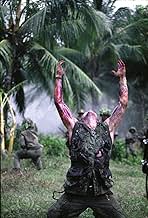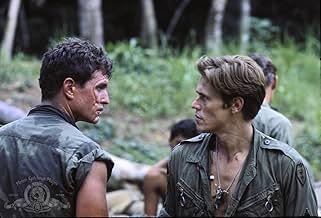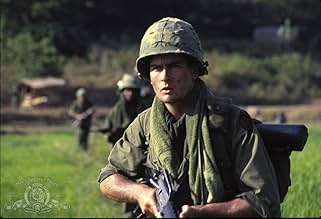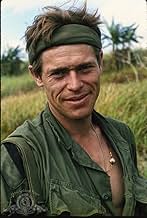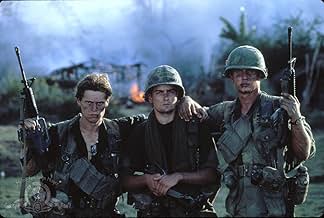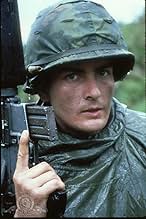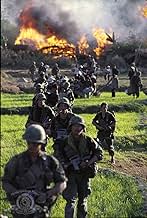क्रिस टेलर, वियतनाम में एक नियोफाइट भर्ती, खुद को दो सार्जेंट, एक अच्छा और दूसरा बुराई के बीच इच्छाओं की लड़ाई में फंस जाता है।क्रिस टेलर, वियतनाम में एक नियोफाइट भर्ती, खुद को दो सार्जेंट, एक अच्छा और दूसरा बुराई के बीच इच्छाओं की लड़ाई में फंस जाता है।क्रिस टेलर, वियतनाम में एक नियोफाइट भर्ती, खुद को दो सार्जेंट, एक अच्छा और दूसरा बुराई के बीच इच्छाओं की लड़ाई में फंस जाता है।
- 4 ऑस्कर जीते
- 24 जीत और कुल 16 नामांकन
सारांश
Reviewers say 'Platoon' is acclaimed for its realistic Vietnam War portrayal, highlighting soldiers' moral and psychological struggles. Oliver Stone's veteran experience enhances authenticity. The film is lauded for its gritty style and strong performances by Willem Dafoe and Tom Berenger. However, some critics argue it oversimplifies moral issues and lacks historical accuracy. Its anti-war message is both praised and criticized for being simplistic and propagandistic. Despite mixed views on artistic merit, 'Platoon' is recognized for its emotional impact and resonance.
फ़ीचर्ड समीक्षाएं
Platoon is generally regarded as one of the strongest anti-war films of all time. While this is certainly true, what's often overlooked -- at least after only one run through the film -- is that it's chiefly a tale of God vs. Satan, and the war is there to set a perilous backdrop. No doubt, Platoon shows the Vietnam War was a big mistake, but being a fictional documentary on Vietnam is far from its purpose.
The story is told from the point of view of Chris Taylor (solidly played by Charlie Sheen), a middle class kid who goes to Vietnam to do what he thinks is his patriotic duty. In the first ten minutes, Chris is shown in the uncomfortable jungle, struggling just to survive in the natural environment, let alone do any actual damage to the enemy. Quickly we're introduced to the well-known facets of the Vietnam War: The lack of sense of purpose, the wraith-like enemies, the obvious prevalence of the uneducated and poor among the fighting grunts -- and, soon, we see how these factors combine to cause widespread low morale and some actions of more than questionable ethical value.
Chris sees his platoon fragmented into two halves, each aligned with one of two men -- Sgt. Elias (Willem Dafoe) and Sgt. Barnes (Tom Berenger). These two really are the driving force behind the film. They both have nominally the same enemy (the Viet Cong), but, really, it doesn't take long to realize that Elias is Good, and Barnes is Evil (the "enemy" does not enter into the moral equation of this film, at all -- it's an outside threat, same as malaria-carrying mosquitoes or even friendly fire). I won't deny it is a very black-vesus-white relationship, but this polarity does not feel contrived. Elias feels the futility of the war and has respect for life; Barnes fights the war doggedly and has no compassion, period. Both are efficient soldiers fighting the same enemy, but really -- as is at one point aptly put by Chris Taylor himself -- they are fighting for the souls of the platoon members, as the outcome of the war is never really in doubt.
Elias/Barnes' hold on the platoon, and the viewer, is developed through several war sequences. A chilling scene takes place in a village, where our soldiers find no VC, but they do find a cache of VC weapons. The inhumanity of certain soldiers, including of Sgt. Barnes, is unflinchingly shown here. It leaves the viewer with an empty feeling that is hard to shake, reminding of the similarly empty look on a woman's face after she sees her son killed in front her.
Elias doesn't take kindly to this kind of behavior. Elias and Barnes come closer and closer to open conflict, as Taylor becomes a veteran, obviously siding with Elias. Meanwhile, the fate of the platoon comes closer and closer to them, culminating in an explosively shot action conclusion. The end is dark, but morally satisfying.
Don't watch this movie for the action. That's not to say it's not well shot, or unrealistic. On the contrary. It's quite convincing. But it doesn't show war as a fun sport, and it's never a question of good guys versus bad guys. There will be no cheering for the "good guys" or anyone else in this one. Stone succeeds brilliantly at putting the viewer into the middle of it all, and it's not a pretty sigh (and definitely not for the squeamish, either).
On the other hand, if you want great acting, it's here. Dafoe and Berenger do incredibly well, with the incredibly good (and seemingly authentically sounding) script. Barnes is horrific as he challenges three men to kill him, drinking hard liquor out of the bottle. They don't make a move, and neither will you, though you'll hate him just as much as them. Dafoe is a ray of light in the dark as Elias. The cast is rounded out with many characters, all well played, and adding another dimension to the film.
The technical aspects of the film are superb, though one never thinks about them much, as the movie is completely engrossing. The production values seem quite good, as well. The most stunning peripheral aspect of this film, however, is the music. It's emotional and draining, and used to great effect -- listen for the main theme as you watch the village burn.
Watch this one a few times, and you'll likely be quite moved each time. I'll be surprised if you give it less than what I gave it: 9/10
The story is told from the point of view of Chris Taylor (solidly played by Charlie Sheen), a middle class kid who goes to Vietnam to do what he thinks is his patriotic duty. In the first ten minutes, Chris is shown in the uncomfortable jungle, struggling just to survive in the natural environment, let alone do any actual damage to the enemy. Quickly we're introduced to the well-known facets of the Vietnam War: The lack of sense of purpose, the wraith-like enemies, the obvious prevalence of the uneducated and poor among the fighting grunts -- and, soon, we see how these factors combine to cause widespread low morale and some actions of more than questionable ethical value.
Chris sees his platoon fragmented into two halves, each aligned with one of two men -- Sgt. Elias (Willem Dafoe) and Sgt. Barnes (Tom Berenger). These two really are the driving force behind the film. They both have nominally the same enemy (the Viet Cong), but, really, it doesn't take long to realize that Elias is Good, and Barnes is Evil (the "enemy" does not enter into the moral equation of this film, at all -- it's an outside threat, same as malaria-carrying mosquitoes or even friendly fire). I won't deny it is a very black-vesus-white relationship, but this polarity does not feel contrived. Elias feels the futility of the war and has respect for life; Barnes fights the war doggedly and has no compassion, period. Both are efficient soldiers fighting the same enemy, but really -- as is at one point aptly put by Chris Taylor himself -- they are fighting for the souls of the platoon members, as the outcome of the war is never really in doubt.
Elias/Barnes' hold on the platoon, and the viewer, is developed through several war sequences. A chilling scene takes place in a village, where our soldiers find no VC, but they do find a cache of VC weapons. The inhumanity of certain soldiers, including of Sgt. Barnes, is unflinchingly shown here. It leaves the viewer with an empty feeling that is hard to shake, reminding of the similarly empty look on a woman's face after she sees her son killed in front her.
Elias doesn't take kindly to this kind of behavior. Elias and Barnes come closer and closer to open conflict, as Taylor becomes a veteran, obviously siding with Elias. Meanwhile, the fate of the platoon comes closer and closer to them, culminating in an explosively shot action conclusion. The end is dark, but morally satisfying.
Don't watch this movie for the action. That's not to say it's not well shot, or unrealistic. On the contrary. It's quite convincing. But it doesn't show war as a fun sport, and it's never a question of good guys versus bad guys. There will be no cheering for the "good guys" or anyone else in this one. Stone succeeds brilliantly at putting the viewer into the middle of it all, and it's not a pretty sigh (and definitely not for the squeamish, either).
On the other hand, if you want great acting, it's here. Dafoe and Berenger do incredibly well, with the incredibly good (and seemingly authentically sounding) script. Barnes is horrific as he challenges three men to kill him, drinking hard liquor out of the bottle. They don't make a move, and neither will you, though you'll hate him just as much as them. Dafoe is a ray of light in the dark as Elias. The cast is rounded out with many characters, all well played, and adding another dimension to the film.
The technical aspects of the film are superb, though one never thinks about them much, as the movie is completely engrossing. The production values seem quite good, as well. The most stunning peripheral aspect of this film, however, is the music. It's emotional and draining, and used to great effect -- listen for the main theme as you watch the village burn.
Watch this one a few times, and you'll likely be quite moved each time. I'll be surprised if you give it less than what I gave it: 9/10
Many great war films of the Vietnam conflict are centered around these themes of blurred morality and the uselessness of war, and Oliver Stone's Platoon is among the most well known. Stone, who wrote and directed the film and also served as an infantryman in Vietnam, first rose to fame for his war films that dramatized the infamous Cold War conflict. The main premise of his magnum opus are the inner conflicts within US forces deployed to southeast Asia, rather than the actual physical conflicts between them and the Communist-allied Vietnamese forces. More broadly, Platoon analyzes the "duality of man" concept that has been studied in numerous other works, from fellow Vietnam War films like Full Metal Jacket (1987) and Apocalypse Now (1979), all the way back to the latter's source material and inspiration in Joseph Conrad's Heart of Darkness.
Platoon focuses on the moral decay of soldiers in American units, and how this contributes to their inability to fight their Vietnamese enemies. Charlie Sheen sums up this theme with his on-the-nose voiceover, "We did not fight the enemy, we fought ourselves... and the enemy was in us."
Vietnam War-movies tend to be even harder to watch than most war flicks, as the lines between the "heroes" and "villains" are blurred more than in any other dramatized period of warfare in recent human history. In wars like World War II, which are widely known for being as black and white as military conflicts have become, the contrasting features between the heroic forces we are meant to root for and their opposing enemy platoons are well defined. That is almost never the case with the United States-North Vietnamese/Vietcong conflict in Vietnam during the overarching Cold War.
That is not to say that most wars throughout human history have not been many shades of grey, with the winners and losers not always corresponding with the righteous and evil. But because of the guerrilla nature and infamous legacy of the Vietnam War itself - namely, the immense public protest against American involvement - the Vietnam War remains by far the most unpopular war in modern American history. With that said, most of the film is fantastic, from the aforementioned narrative to the grim lightning of the southeast Asian jungles that emphasize the film's tone, to the poignant, melancholic score.
Platoon focuses on the moral decay of soldiers in American units, and how this contributes to their inability to fight their Vietnamese enemies. Charlie Sheen sums up this theme with his on-the-nose voiceover, "We did not fight the enemy, we fought ourselves... and the enemy was in us."
Vietnam War-movies tend to be even harder to watch than most war flicks, as the lines between the "heroes" and "villains" are blurred more than in any other dramatized period of warfare in recent human history. In wars like World War II, which are widely known for being as black and white as military conflicts have become, the contrasting features between the heroic forces we are meant to root for and their opposing enemy platoons are well defined. That is almost never the case with the United States-North Vietnamese/Vietcong conflict in Vietnam during the overarching Cold War.
That is not to say that most wars throughout human history have not been many shades of grey, with the winners and losers not always corresponding with the righteous and evil. But because of the guerrilla nature and infamous legacy of the Vietnam War itself - namely, the immense public protest against American involvement - the Vietnam War remains by far the most unpopular war in modern American history. With that said, most of the film is fantastic, from the aforementioned narrative to the grim lightning of the southeast Asian jungles that emphasize the film's tone, to the poignant, melancholic score.
Its hard to know where to start with such a breathtaking film. Oliver Stone's Platoon is quite simply the best Vietnam war film ever made in my opinion. Everything about it is as close to perfection as we are likely to see. Charlie Sheen plays the lead, and Willem Defoe and Tom Berenger play the two sergeants that form a key part of the plot.
Chris Taylor (Sheen) is torn between the sergeants. Barnes (Berenger) is the battle hardened, brutal murderer, who uses the war as an excuse to tender to his sadistic pleasures. Elias (Defoe) is the other side of the spectrum. We get the sense that he has wrestled with his inner demons, but he has successfully come through to the other side. He has compassion for his fellow man, and he uses drugs as a form of escapism from this brutal war. The two symbolise the struggle that Taylor must face if he is to survive out in Vietnam.
Oliver Stone perfectly captures war. The shooting is frantic and impossible to follow. It perfectly disorientates us, just as the soldiers were. We have no idea who is being shot at, and neither do they. We follow the war at ground level, and see the brutalities first hand. Having served in Vietnam, the film is loosely based on Stone's time out there, and Taylor loosely based on himself.
Full Metal Jacket showcases how inhumane the war was, Apocalypse Now turns it into a story about life in general, and hopelessness, but Platoon has everything. Trying hard to avoid the old cliché, but if you only watch one war film, make sure it is this one. Nothing else can come close.
Chris Taylor (Sheen) is torn between the sergeants. Barnes (Berenger) is the battle hardened, brutal murderer, who uses the war as an excuse to tender to his sadistic pleasures. Elias (Defoe) is the other side of the spectrum. We get the sense that he has wrestled with his inner demons, but he has successfully come through to the other side. He has compassion for his fellow man, and he uses drugs as a form of escapism from this brutal war. The two symbolise the struggle that Taylor must face if he is to survive out in Vietnam.
Oliver Stone perfectly captures war. The shooting is frantic and impossible to follow. It perfectly disorientates us, just as the soldiers were. We have no idea who is being shot at, and neither do they. We follow the war at ground level, and see the brutalities first hand. Having served in Vietnam, the film is loosely based on Stone's time out there, and Taylor loosely based on himself.
Full Metal Jacket showcases how inhumane the war was, Apocalypse Now turns it into a story about life in general, and hopelessness, but Platoon has everything. Trying hard to avoid the old cliché, but if you only watch one war film, make sure it is this one. Nothing else can come close.
This certainly rates as one of the best Vietnam films of all time. What I especially enjoyed was the realistic atmosphere of the film, entrenching the viewer into a world which seems surreal yet believable. Oliver Stone's real-life experience in Vietnam brought a gifted outlook to this film, one drawn by experience, not common Hollywood conventions. While this proved be a lesser film to the equally amazing Full Metal Jacket, it was not by much. The performances by Tom Berenger, Willem Dafoe, Charlie Sheen and John C. McGinley were exceptional, capturing the plight of the tortured soldiers.
At the height of the Vietnam War, America's teens are drafted into the war effort to find themselves in the middle of hell. One such young man is Chris Taylor. He is placed in a squadron where two sergeants have different approaches to the war Elias is more about surviving without being brutal or cruel, whereas Barnes is crueller, more ruthless and more violent. During the course of his term, Taylor's very soul is torn between the two men as he deals with what he must do.
The first film in Oliver Stone's unofficial trilogy is arguably the best of the three. The basic story not only shows us what the war was like for those serving but also how the different personalities come out of those involved in it. As we follow Taylor we see him change as he is influenced by those around him and by his situation. It makes for an uncomfortable film but one that's worth watching. It's certainly a better war movie than things like Wild Geese or The Dirty Dozen, simply because it's a little more real to what happens than those ones.
Charlie Sheen has never been better than when he's acting for Stone. Here he gives one of his best ever performances as the innocent who is changed. Willem Dafoe is a great actor and here is no different he also gives us one of the film's most enduring images so I'm a little biased. Berenger is another one for whom it's hard to think of a higher point reached than when he did this film. He is brutal and ruthless but he makes us support him in a strange way. The support cast are all good and contains a few famous faces (John C McGinley, Whitaker, Depp) however this is really a three man show.
Overall this is brutal and violent with no happy ending. At the end of the day isn't that what a war film should be?
The first film in Oliver Stone's unofficial trilogy is arguably the best of the three. The basic story not only shows us what the war was like for those serving but also how the different personalities come out of those involved in it. As we follow Taylor we see him change as he is influenced by those around him and by his situation. It makes for an uncomfortable film but one that's worth watching. It's certainly a better war movie than things like Wild Geese or The Dirty Dozen, simply because it's a little more real to what happens than those ones.
Charlie Sheen has never been better than when he's acting for Stone. Here he gives one of his best ever performances as the innocent who is changed. Willem Dafoe is a great actor and here is no different he also gives us one of the film's most enduring images so I'm a little biased. Berenger is another one for whom it's hard to think of a higher point reached than when he did this film. He is brutal and ruthless but he makes us support him in a strange way. The support cast are all good and contains a few famous faces (John C McGinley, Whitaker, Depp) however this is really a three man show.
Overall this is brutal and violent with no happy ending. At the end of the day isn't that what a war film should be?
Oscars Best Picture Winners, Ranked
Oscars Best Picture Winners, Ranked
See the complete list of Oscars Best Picture winners, ranked by IMDb ratings.
क्या आपको पता है
- ट्रिवियाAccording to Oliver Stone, he intentionally cast Tom Berenger and Willem Dafoe against type. Berenger was mostly famous for playing good guys, while Dafoe had primarily played villains up until then. Both men received Oscar nominations for their work.
- गूफ़When the men are playing cards, one of the men is looking at a Playboy from March 1971, despite the film taking place in 1967.
- भाव
[Refering to Vietnam]
Chris Taylor: Somebody once wrote, "Hell is the impossibility of reason." That's what this place feels like. Hell. I hate it already, and it's only been a week. Some goddamn week.
- इसके अलावा अन्य वर्जनTV version has much of its dialogue redubbed and shots refilmed, replacing such lines as "He thinks he's Jesus F---in' Christ!" with "He thinks he's George Freakin' Washington!"
- कनेक्शनEdited into A Tour of the Inferno: Revisiting 'Platoon' (2001)
- साउंडट्रैकAdagio for Strings
Written by Samuel Barber
Arranged and Conducted by Georges Delerue
Used by arrangement with G. Schirmer, Inc.
टॉप पसंद
रेटिंग देने के लिए साइन-इन करें और वैयक्तिकृत सुझावों के लिए वॉचलिस्ट करें
विवरण
बॉक्स ऑफ़िस
- बजट
- $60,00,000(अनुमानित)
- US और कनाडा में सकल
- $13,85,30,565
- US और कनाडा में पहले सप्ताह में कुल कमाई
- $2,41,080
- 21 दिस॰ 1986
- दुनिया भर में सकल
- $13,85,46,255
- चलने की अवधि
- 2 घं(120 min)
- रंग
- ध्वनि मिश्रण
- पक्ष अनुपात
- 1.85 : 1
इस पेज में योगदान दें
किसी बदलाव का सुझाव दें या अनुपलब्ध कॉन्टेंट जोड़ें







